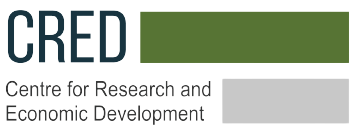Meet the Team

Dr. Usman Mahar
Researcher
Dr. Usman Mahar is a researcher in anthropology and a research fellow at the Center for Governance and Culture (GCE), University of St Gallen, Switzerland.
Trained in the field of anthropology, Dr. Mahar works at the intersection of migration research and affect studies to illuminate the power of emotions, feelings, motivations, moods, and other affective processes in the migratory lives of people subjected to unequal mobility through restrictive border regimes. His research and leadership at the Center for Research in Economic Development (CRED) delve into the intersection of migration, economics, and social policy, providing insights into the ways in which migration shapes and is shaped by postcolonial forces and social policies. Dr. Mahar’s scholarly pursuits at CRED are characterized by a deep-seated commitment to uncovering the human stories behind migration statistics. His interdisciplinary approach weaves together anthropology, economics, and policy analysis. At CRED, he spearheads Southern scholarly initiatives that aim to translate academic research into actionable strategies for decolonial development approaches, with a particular emphasis on inclusivity and the empowerment of marginalized communities.
where he specialized in Polymer Optical Fiber-based Glucose Sensors. His extensive background, including a Master’s in Photonics and a Bachelor’s in Laser & Optoelectronics, complements years of R&D experience in the development of optical products and medical devices. Previously, he was a key researcher at the Institut de Physique du Globe de Paris, where his work was instrumental in advancing optical technologies for NASA’s lunar seismology missions. Dr. Hassan’s notable contributions include his involvement in the development of the Insight Mars Lander’s 3-axis seismometer and his collaboration with Ixblue, France, on an interferometric sensor for lunar missions. His research endeavors at the Technical University of Denmark were marked by significant advancements in optical sensors for cancer detection and his leadership in the EU project ESOTRAC. His tenure at Medtronic during his industrial PhD has been characterized by his practical application of research in medical photonics, showcasing his interdisciplinary approach and dedication to pioneering photonics applications in both medical and space domains.

Dr. Abbas Askar
Analytical and data management
Dr. Abbas Askar. is an experimental astrophysicist by training and is interested in using experimental methods in natural and social sciences.
At the Center for Research on Economic Development (CRED), Dr. Askar occupies a pivotal role in leading the analytical and data management teams. His tenure as the head of the Ethics Committee builds on his extensive experience in assisting experimental work for industrial and academic partners. His contributions have proven to be invaluable in shaping policy decisions with a strong foundation in evidence-based research. His approach to dissecting complex systems and their progression is applicable to the analysis of economic development trends and the evaluation of policy outcomes on a broad spectrum has been pivotal in this work at CRED. In his current academic capacity as faculty at the Nicolaus Copernicus Astronomical Center of the Polish Academy of Sciences in Warsaw, Poland, he is engaged in groundbreaking research within the realm of astrophysics, collaborating closely with the MOCCA code development team. His research portfolio includes an in-depth focus on black holes, compact object binaries, gravitational waves, and the dynamic properties of dense stellar systems. He is at the forefront of the POLONEZ BIS 1 project, “Growing Black Holes in Star Clusters” (BHGrowth), which spans from 2023 to 2025 and is financed by the Polish National Science Centre in conjunction with the EU’s Horizon 2020 program. His prior contributions to the ‘Stellar Dynamics and Evolution’ research group at Lund University’s Lund Observatory were significant, building on his PhD research that delved into the dynamical evolution of globular clusters and their compact objects, employing sophisticated simulation methodologies.
tasks such as office management, procurement, HR functions, and payment processing. Previously, Arslan served as an accounts officer at the Conservation & Rehabilitation Centre (CRC), where he was responsible for budget preparation, financial documentation, and interim reporting for various projects, including the Environmental Rehabilitation and Heritage Conservation of the UCH Monuments at Sindh. Additionally, he gained experience as an Audit Officer at M/S Rahman & Co. (Chartered Accountants). Arslan holds a Master’s degree in Operations from the University of Punjab.

Muzaffer Iqbal
Associate Director of Research Development
Muzaffer Iqbal is the Associate Director of Research Development at CRED. His interests lie in policy issues
and research related to public health, nutrition, gender, employment, GIS, energy, and the environment. He also serves as a technical advisor on the evaluation of market tests of maternal nutrition supplements in Pakistan. He formerly led the Women’s Health Program at CRED, which consisted of multi-year RCT studies on the barriers to women’s hygiene in Pakistan. He was part of CRED’s team collaborating with the health department of Punjab, Pakistan in developing its emergency health policy response to COVID-19. Muzaffer is a Fulbright Scholarship alumnus with a degree in Public Policy and Management. He also has a background in Finance.
execution, and completion of research projects with meticulous attention to detail. With a background rooted in Economics, he earned his P.h.D. from the esteemed Lahore University of Management Sciences (LUMS) in Pakistan. With a passion for project management, effective communication and teamwork lie at the heart of Dr. Rana’s approach, fostering collaborative environments where research teams thrive and ideas flourish. Dr Rana’s credentials are further solidified by his active membership in various professional research communities, where he regularly contributes insights drawn from his extensive work at CRED, keeping him at the forefront of industry trends and best practices.

Dilawar Hussain
Associate Director of Analytics
Dilawar Hussain is the Associate Director of Analytics, at CRED. He brings over 12 years of diverse experience in the Development Sector
focusing on the implementation and organization of large-scale Randomized Controlled Trials (RCTs) and policy evaluations. Dilawar possesses a strong academic foundation. Dilawar has previously contributed his expertise to esteemed organizations such as the World Bank and, IFAD. His role in these institutions involved implementing and managing various RCTs, leveraging his research interests spanning Behavioral Economics, and Agri-tech. In his previous roles, Dilawar has demonstrated a commitment to driving impact through evidence-based decision-making and innovative solutions. He has a proven track record of making significant contributions to improving public service delivery and operational efficiencies. His expertise extends to bringing about digital transformations and process optimizations, all aimed at creating tangible positive outcomes in the Health and Education sectors. Dilawar’s motivation stems from impact-oriented tasks, where he thrives on leveraging technology and data-driven insights to drive meaningful change. With a keen eye for detail and a passion for addressing complex challenges, he is dedicated to advancing the field of development economics through rigorous research and practical implementation strategies.

